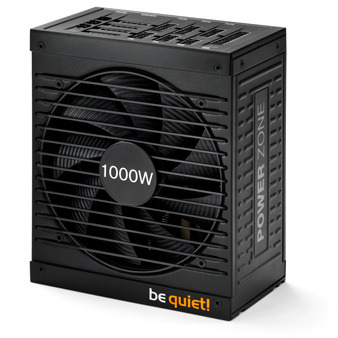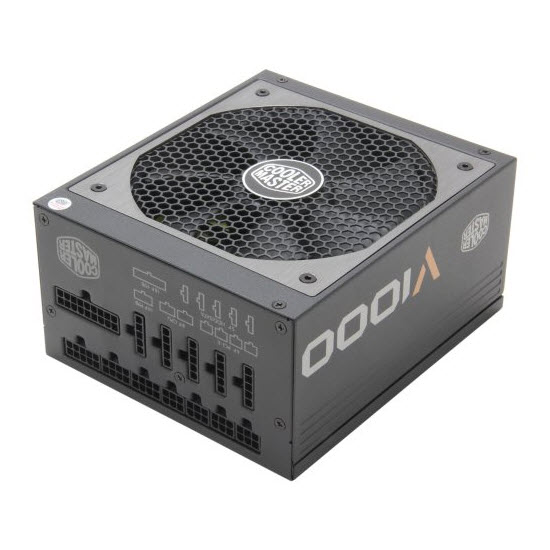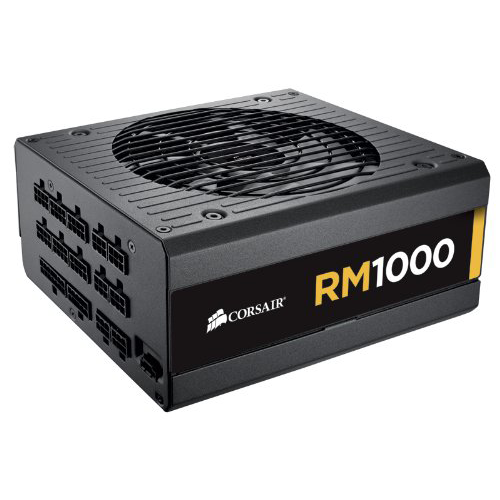Rosewill Quark 1000 Power Supply Review
Today we take a look at Rosewill's Quark 1000. In addition to 80 PLUS Platinum efficiency and fully modular cabling, this $200 unit can support multiple GPUs.
Why you can trust Tom's Hardware
Load Regulation, Hold-Up Time And Inrush Current
To learn more about our PSU tests and methodology, please check out How We Test Power Supply Units.
Primary Rails And 5VSB Load Regulation
Load Regulation testing is detailed here.
The following charts show the voltage values of the main rails, recorded over a range from 40W to the maximum specified load, and the deviation (in percent) for the same load range. You will also find a chart showing how the 5VSB rail deals with the load we throw at it.
Hold-Up Time
Our hold-up time tests are described in detail here.
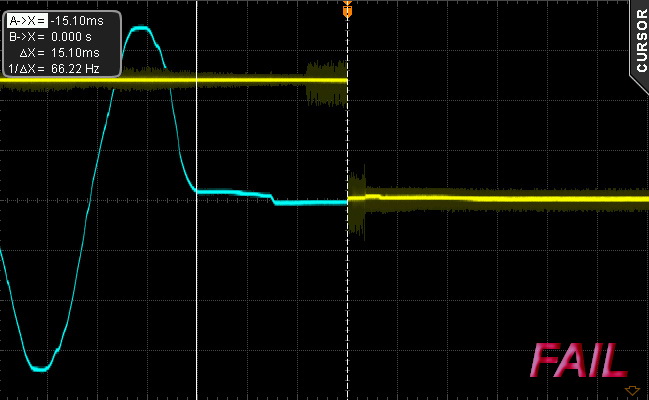
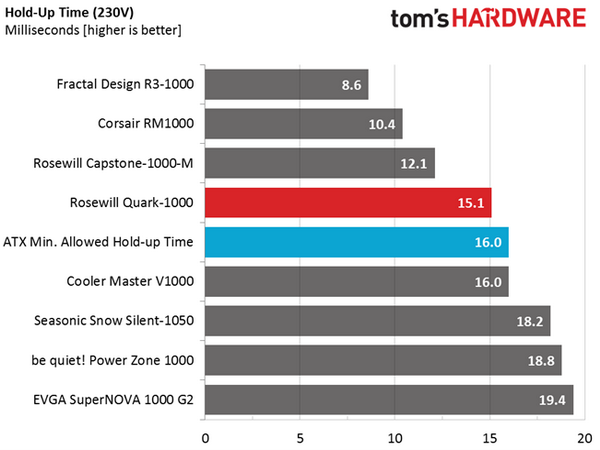
The hold-up time was below 16ms, meaning the PSU didn't successfully pass our hold-up test. That's disappointing from a high-end unit.
Inrush Current
For details on our inrush current testing, please click here.
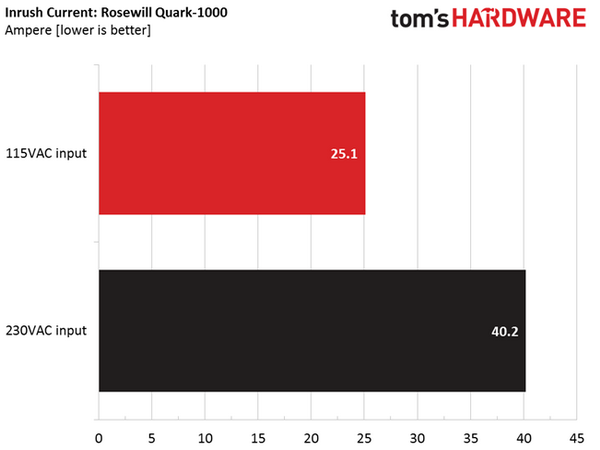
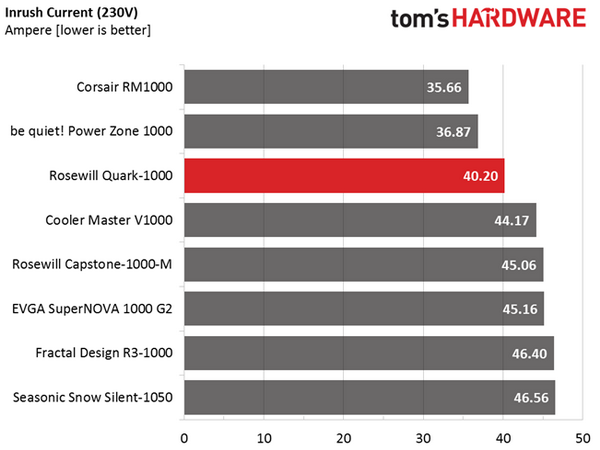
The registered inrush current at 115V and 230V inputs was low for a unit of this capacity. We would much prefer a higher inrush current for a hold-up time that would exceed 16ms, since the capacity of the APFC bulk cap(s) plays a key role in inrush current.
Get Tom's Hardware's best news and in-depth reviews, straight to your inbox.
Load Regulation And Efficiency Measurements
The first set of tests reveals the stability of the voltage rails and the PSU's efficiency. The applied load equals approximately 10 to 110 percent of the maximum load the supply can handle, in increments of 10 percentage points.
We conducted two additional tests. During the first, we stressed the two minor rails (5V and 3.3V) with a high load while the load at +12V was only 0.10A. This test reveals whether the PSU is Haswell-ready or not. In the second test, we determined the maximum load the +12V rail could handle while the load on the minor rails was minimal.
| Test | 12V (A/V) | 5V (A/V) | 3.3V (A/V) | 5VSB (A/V) | Power DC/AC (W) | Efficiency (%) | Fan Speed (RPM) | Fan Noise dB(A) | Temp In/Out (°C) | PF/AC (V) |
|---|---|---|---|---|---|---|---|---|---|---|
| 1 | 6.494A | 2.003A | 1.978A | 1.005A | 99.80 | 86.44 | 1020 | 38.5 | 37.70 | 0.949 |
| 12.040V | 4.998V | 3.334V | 4.967V | 115.45 | 42.42 | 115.0V | ||||
| 2 | 14.032A | 2.999A | 2.975A | 1.210A | 199.60 | 91.09 | 1080 | 39.1 | 38.89 | 0.967 |
| 12.027V | 4.986V | 3.324V | 4.954V | 219.13 | 44.02 | 115.0V | ||||
| 3 | 21.964A | 3.510A | 3.495A | 1.415A | 299.81 | 92.03 | 1370 | 44.3 | 39.18 | 0.975 |
| 12.009V | 4.975V | 3.316V | 4.940V | 325.77 | 44.94 | 115.0V | ||||
| 4 | 29.897A | 4.024A | 3.986A | 1.620A | 399.66 | 92.25 | 1570 | 49.3 | 40.42 | 0.982 |
| 11.991V | 4.967V | 3.309V | 4.928V | 433.26 | 47.23 | 115.0V | ||||
| 5 | 37.510A | 5.039A | 5.000A | 1.830A | 499.60 | 92.06 | 1775 | 50.1 | 41.23 | 0.986 |
| 11.974V | 4.956V | 3.299V | 4.911V | 542.72 | 48.82 | 114.9V | ||||
| 6 | 45.151A | 6.065A | 6.015A | 2.040A | 599.57 | 91.72 | 1810 | 50.3 | 42.28 | 0.989 |
| 11.955V | 4.946V | 3.291V | 4.898V | 653.70 | 51.40 | 114.9V | ||||
| 7 | 52.813A | 7.087A | 7.038A | 2.249A | 699.50 | 90.87 | 1820 | 50.4 | 43.11 | 0.991 |
| 11.937V | 4.936V | 3.282V | 4.887V | 769.80 | 54.10 | 114.9V | ||||
| 8 | 60.501A | 8.122A | 8.068A | 2.459A | 799.44 | 90.33 | 1820 | 50.4 | 44.42 | 0.992 |
| 11.918V | 4.926V | 3.272V | 4.873V | 885.00 | 57.24 | 114.9V | ||||
| 9 | 68.660A | 8.644A | 8.607A | 2.463A | 899.50 | 89.75 | 1820 | 50.4 | 45.26 | 0.993 |
| 11.898V | 4.917V | 3.264V | 4.868V | 1002.25 | 60.19 | 114.9V | ||||
| 10 | 76.792A | 9.163A | 9.122A | 2.570A | 999.29 | 89.07 | 1820 | 50.4 | 46.52 | 0.993 |
| 11.878V | 4.909V | 3.255V | 4.856V | 1121.90 | 63.43 | 114.9V | ||||
| 11 | 85.329A | 9.179A | 9.141A | 2.575A | 1099.25 | 88.53 | 1820 | 50.4 | 46.95 | 0.994 |
| 11.861V | 4.901V | 3.248V | 4.849V | 1241.70 | 65.67 | 114.9V | ||||
| CL1 | 0.098A | 14.019A | 14.005A | 0.004A | 117.05 | 82.02 | 1820 | 50.4 | 43.70 | 0.949 |
| 12.032V | 4.956V | 3.311V | 5.017V | 142.71 | 49.75 | 115.0V | ||||
| CL2 | 82.933A | 1.001A | 1.003A | 1.001A | 998.63 | 89.55 | 1820 | 50.4 | 45.40 | 0.994 |
| 11.883V | 4.938V | 3.274V | 4.909V | 1115.15 | 61.80 | 114.9V |
The load regulation on all rails was within three percent, though we would like to see the regulation on the +12V rail to be within one percent, given its importance. As for efficiency, although this unit wasn't officially certified by the 80 PLUS organization at the time of the review, we found that it meets the Platinum requirements even under extremely tough conditions.
With up to 20 percent of its maximum-capacity load, the noise output was below 40 dB(A), so it wasn't in the annoying region for most users. However, the combination of high ambient temperatures along with increased loads forced the fan control circuit to operate the fan at higher speeds, increasing output noise. Finally, the large heat sinks and the fan's airflow work well together. This is shown by the large delta between the PSU's input and exhaust.
Current page: Load Regulation, Hold-Up Time And Inrush Current
Prev Page A Look Inside And Component Analysis Next Page Efficiency, Temperatures And Noise
Aris Mpitziopoulos is a contributing editor at Tom's Hardware, covering PSUs.
-
ern88 I don't know of Rosewill is any better then it was a few years ago. I had friends with a rosewill PSU and it baked big time. Maybe they are better now. But I would stick with EVGA or another well known good company!!!Reply -
justaguywithagun i wouldnt hesitate to replace my ~7y/o antec TP750 with a nice rosewill capstone unit when the time comes. in fact, thats essentially my plan. would i throw any rosewill unit in my rig/s? no i wouldnt, but every manufacturer i can think of has units that are less than desirable. rosewill has a come a long long way the last few yearsReply -
Larry Litmanen ReplyI don't know of Rosewill is any better then it was a few years ago. I had friends with a rosewill PSU and it baked big time. Maybe they are better now. But I would stick with EVGA or another well known good company!!!
Obviously EVGA has amazing brand name and they deserve it because of their level of service. However as far as i know EVGA does not have any PSU making plants, they simply rebrand a unit made by Seaconic or another OEM. Many companies do that, so you can probably buy exactly the same unit from a different brand.
I am not sure if Rosewill builds or rebrands, but i had their products and they are not bad, i personally have not had any issues. -
Aris_Mp Several Rosewill PSUs are build by Super Flower, the same OEM that also makes most of EVGA's offerings.Reply -
none12345 "I don't know of Rosewill is any better then it was a few years ago. I had friends with a rosewill PSU and it baked big time. Maybe they are better now. But I would stick with EVGA or another well known good company!!! "Reply
I duno if their large ones are as good. But ive had a 550 watt running in this computer for 6.5 years now with no problem. This is the first roswell one i had tried. Thats the longest ive ever stayed on the same power supply.(In the past it was either fry, or had to upgrade the size because of ever increasing component power usage) -
Aris_Mp Like every company that wants to do well into this market Rosewill doesn't rely on only one manufacturer. They had strong ties with Super Flower in the past however they decided to go with other OEMs as well, since SF became so popular and cannot meet the demands of all the companies that want their products.Reply -
Shalmaneser Does anyone actually do OCP, OVP, OPP / OLP, OTP, UVP, SCP, andReply
NLO? (Something of a rhetorical question), short answer from google is no...
Also, why is the list graphical? I'd like to have a character list to search through...
